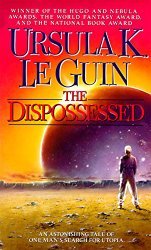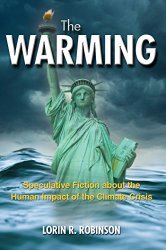Treesong's Blog: Treesong on Goodreads - Posts Tagged "speculative-fiction"
Book Review: The Dispossessed by Ursula K. Le Guin

The basic premise is fairly simple. The Tau Ceti star system is home to two twin planets, Urras and Anarres. Urras is a verdant, hospitable world that has been inhabited by humanoid life for millennia. Anarres, on the other hand, is a sparsely populated desert world that was settled two hundred years ago by revolutionary anarchists. Aside from a single freighter that periodically makes the trip, the two worlds — archist Urras and anarchist Anarres — are completely isolated from each other. The story starts with the first person traveling from Anarres to Urras since the revolution that lead to the settlement of Anarres.
What makes The Dispossessed a remarkable work of literature is the ease with which it explores a wide range of fascinating and important themes and topics through the lens of a compelling plot and cast of characters. Many books have one or more of these elements — compelling characters, compelling plot, interesting political ideas, interesting scientific ideas, interesting philosophical ideas, etc. The Dispossessed combines all of the above into an impressively cohesive and compelling narrative.
The main obvious theme is the role of government in human societies. The simplest explanation of the plot is that it’s a utopian tale exploring what it would be like if an anarchist (specifically anarcho-syndicalist) society had an entire world on which to develop its own social institutions and culture. This is contrasted with the realities of the archist (a.k.a. statist) world. Urras is dominated by two nation-states — the capitalist (“propertarian”) A-Io and the communist Thu. These two nation-states are drawn into a proxy war that serves as a fairly transparent (but creatively executed) analogy for the real-world conflict in Vietnam and the Cold War generally.
There are, however, many additional nuances to the setting and story that go beyond the role of government. Gender, sex, and sexuality are explored at some length, contrasting the patriarchy and possessive of A-Io with the gender equality and sexual liberation of Anarres. Physics and philosophy are also discussed at great length because the main character, Shevek, is a theoretical physicist and philosopher who is searching for a unified theory of time and space similar to the one that real-world physicists are searching for.
Part of what makes The Dispossessed such an exceptional novel is its utopian realism. The dichotomy between Urras and Anarres initially seems quite simple — the dystopian “propertarians” versus the utopian anarchists. As the novel progresses, however, the narrative explores the strengths and weaknesses of both worlds in a complex and realistic manner. Anarres clearly has the more liberatory society, but its emphasis on mutual aid ironically leads to an overemphasis on social approval and acceptance which can discourage innovation and independent thinking. Urras is clearly a troubled propertarian society, but their world has so much more material wealth and abundance of living creatures. Shevek has many interesting and rewarding experiences on Urras, even though A-Io’s institutions and culture are ultimately contrary to his values.
The Dispossessed offers an exciting exploration of life’s nature and purpose. The depth and thoughtfulness of this exploration is rare both in fiction and reality. It’s an exciting (and at times harrowing) journey through many questions about life, love, the world, the cosmos, and everything in between. I highly recommend this book to anyone and everyone. I’m also glad to see that others have already developed curricula related to The Dispossessed. This is a book that should be taught in literature, philosophy, and other classes right along with other great classics of utopian and dystopian fiction.
For this and other reviews by Treesong, visit treesong.org.
Published on September 19, 2015 17:50
•
Tags:
anarchism, book-review, dystopian, sci-fi, speculative-fiction, utopian
Book Review: The Warming by Lorin R. Robinson

Let me start by describing what I like.
The Warming is an ambitious effort to explore many aspects of the climate crisis and its impact on the future of humanity. Rather than picking a single timeframe, location, or even storyline, the author explores the impacts of "The Warming" (anthropogenic global warming) over the course of several decades, on several continents, and in the lives of several distinct sets of characters. The scope of these narratives ranges from small personal tales to epic stories involving the ultimate fates of entire cities and nations. The possibilities explored range from dystopian destruction of existing infrastructure to utopian visions for how to survive and thrive in the aftermath of The Warming.
Some of these ideas were nothing new. Others were entirely new and unexpected. Some were so interesting that I intend to do some research about whether they were pure fiction or if they have some basis in reality. Either way, this book is worth reading if only as a collection of interesting ideas related to the climate crisis.
That's the good news. Now, on to the bad news, or at least the "definitely not five stars" news.
I don't know what to call this book. Is it a novel? The author calls it a novel, but the organizational structure is more reminiscent of a short story anthology. The author explains this unusual structure in an "important note for the reader" at the beginning of the book. The fact that this was an intentional choice -- a choice explained by the author at the very beginning -- made it more palatable. It weaves together three separate components: a primary twelve-chapter narrative about a marine biologist; a secondary narrative about an environmental news reporter; and several distinct short stories that provide some background about what's going on in the world outside of the main plotlines.
The originality and unusualness of this organizational structure initially intrigued me. I found it to be an interesting experiment both as a fellow author and as a reader. However, the more I read, the more this three-in-one structure just seemed overly busy. I would have preferred to read three shorter books: the marine biologist novel, the news reporter screenplay, and the short story anthology. They could have even been bundled in different sections of the same book since they take place in the same broad setting. However, having them split up and inserted in between each other just seemed to break the flow of the narratives. If the author is insistent that this structure is the right one for this book, then maybe this structural difficulty can be smoothed out a bit by more blatant transitions between the three elements -- for example, calling them "CHAPTER X", "EPISODE Y", and "STORY Z".
The book could also benefit from another round of basic editing. The average reader may not mind the occasional typos and style quirks, but fellow authors and industry professionals will find them distracting.
I also wasn't terribly impressed with the main narrative about the marine biologist. The ideas it explored were very interesting, but the characters and plot were lukewarm. The short stories were generally more impressive because they took a single interesting climate-related scenario and explored it succinctly from beginning to end. The main narrative (and to a lesser extent, the news reporter narrative) explored some very interesting ideas, but the characters themselves fell flat. The main character seems to be having a fairly standard-issue midlife crisis that unsurprisingly takes an adventurous and exciting turn. The supporting characters seem like little more than foils to the main character's plot arc and character development. It's not that there's necessarily anything wrong with a novel centered around a man's midlife crisis and how it relates to the climate crisis. But I feel like it will have a strong appeal to a certain male demographic, and not as much appeal to other audiences. It's interesting to a degree, but it lacks the universal appeal that I would expect from a story centered on a universal topic like the climate crisis.
In the end, the saving grace of this novel was the strength of the ideas it explores. I found myself more than willing to stick with the lukewarm elements of the novel because it centered around some interesting problems and solutions associated with the climate crisis.
Published on April 04, 2016 08:45
•
Tags:
cli-fi, climate-fiction, global-warming, review, speculative-fiction
Treesong on Goodreads
Treesong is an author, talk radio host, community organizer, and Real Life Superhero. His main writing focus is climate fiction ("cli-fi"), but he is also a lifelong fan of science fiction, fantasy, a
Treesong is an author, talk radio host, community organizer, and Real Life Superhero. His main writing focus is climate fiction ("cli-fi"), but he is also a lifelong fan of science fiction, fantasy, and related genres.
This blog features Treesong's occasional musings on his writing, the writing of other authors, and anything else that comes up along the way. ...more
This blog features Treesong's occasional musings on his writing, the writing of other authors, and anything else that comes up along the way. ...more
- Treesong's profile
- 40 followers



